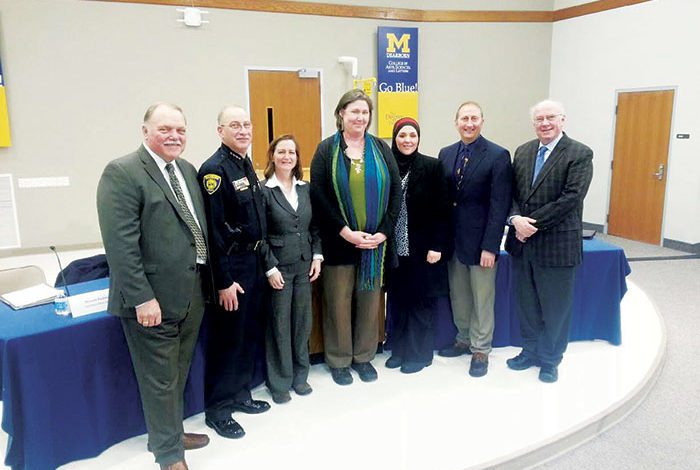
|
| Chief Ronald Haddad, U.S. Attorney Barbara McQuade, UM-D professor Sally Howell, ADC Michigan Director Fatina Abdrabboh, Judge David Turfe, UM-D president Dan Little. |
DEARBORN — A panel of local and regional community officials gathered Tuesday, March 3 at the University of Michigan-Dearborn to discuss various civil rights, law enforcement, judicial and media bias issues affecting the Arab community in both the U.S. and Michigan.
Barbara McQuade, the U.S. Attorney for the Eastern District of Michigan; Fatina Abdrabboh, the Michigan director of the American-Arab Anti-Discrimination Committee (ADC); Dearborn Heights District Judge David Turfe and Dearborn Police Chief Ronald Haddad sat on the panel.
Even though the theme for the event was criminal justice in the Arab community, the recurring topic of discussion for the evening was the mainstream media’s bias and the violent effects of the stereotypical and fear-mongering portrayal of Arab and Muslim Americans. The problem seems to be growing over the past 15 years, according to panelists.
“After 9/11, I was working in national security and we saw a great deal of backlash against Arab Americans in our community,” McQuade said. “I don’t know why it is, but I suppose there are some people who prefer to stereotype and have simple minds; and when they see hijackers of Arab descent they immediately want to lash out against someone else of Arab descent, which I find absurd.”
The negative results of media biases on the Arab American community are not limited to violence, the panelists argued.
“With 24-hour news coverage and the Internet, there is a direct correlation between world events and increased complaints to the ADC office; it’s just clockwork,” Abdrabboh said. “The question, then, for us, is how can we together make sure that Arab Americans and Muslim Americans don’t receive an indictment on the virtue of things that happen abroad.”
The ADC Michigan director added that there is a huge economic industry in the U.S. that benefits from igniting the flames of anti-Arab and anti-Muslim sentiment.
She cited two recent polls conducted by the Associated Press and Gallup that showed 39 percent of Americans surveyed have some prejudice against Muslims and 38 percent would feel uncomfortable sitting next to a Muslim on an airplane.
Questions from the audience focused on legal incidents involving Arab Americans, specifically the Feb. 10 Chapel Hill, N.C. killings; the Feb. 12 attack on a Muslim family at a Kroger in Dearborn and an incident in Dearborn Heights last summer when a Muslim woman was forced to remove her hijab after being detained by police for driving on a suspended license.
However, the audience’s questions were met with unanimous “no comment” answers by law enforcement and judicial officials on the panel because investigations and warrants were still pending in the local cases.
Even Dearborn Heights Police Chief Lee Gavin, who was not on the panel but in attendance in full uniform, did not wish to comment.
Although McQuade did not comment on the North Carolina incident directly, she said she is “concerned about the escalation we’re seeing, just like after we saw after 9/11.” She also said we’re seeing an increase of biased incidents because of the activity and coverage of ISIS in the Middle East.
“Just remember one thing, cases are not tried by the media; they are tried in a courtroom,” Turfe said. “And how many times are people found guilty by the media and not guilty in a courtroom? Just because the media gives you a perspective, they are not giving you all the facts and information. They just give you snippets to make the story popular.”
He said there is so much media, but very few voices, and that there needs to be more minority perspectives from the Arab, Black and Latino American communities to help offset the current polarizing coverage and views of mainstream media.
“I think the media is driven by rating and they want to give the people what they want,” McQuade said. “But if you look at a decade ago, it was okay to make sexist jokes, it was okay to make Black jokes. I think if you hold the media accountable, then it evolves, it changes; and people say ‘we won’t accept this any more.’”
The panel was the second part in a symposium series by the University of Michigan-Dearborn College of Arts, Sciences, and Letters College-Wide Programs and featured three days of discussions pertaining to diversity and justice.






Leave a Reply